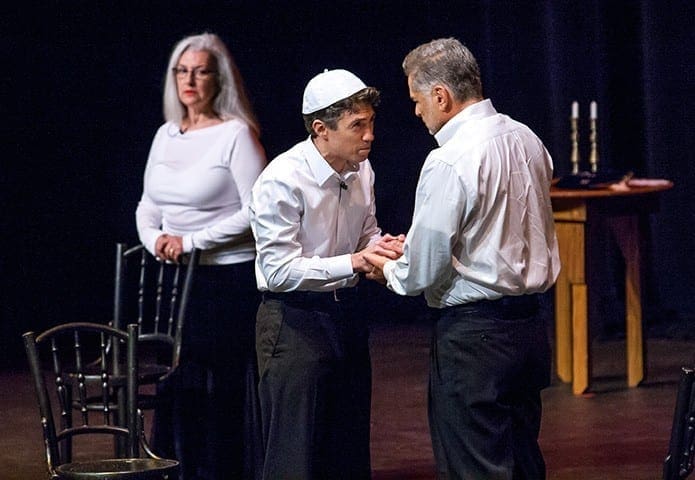 Photo by Thomas Spink
Photo by Thomas SpinkJubilee inspires Catholic-Jewish cultural celebration in Atlanta
By ANDREW NELSON, Staff Writer | Published November 12, 2015
ATLANTA—An evening of theater and the arts was the capstone to a jubilee year focused on the landmark document “Nostra Aetate,” which rebuilt the foundation of dialogue between the Catholic Church and the Jewish community.
“Great historical things do not come easy,” said Rabbi James Rudin, a leader in interreligious relations, speaking at the Ferst Center for the Arts at Georgia Tech Oct. 28. Several hundred people from the two faith communities attended an evening program of drama, dance and music organized by the American Jewish Committee-Atlanta and the Archdiocese of Atlanta.
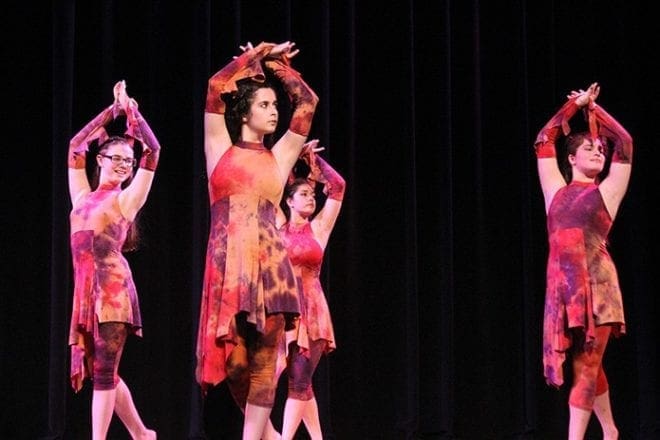
The Weber School Dance Ensemble was one of the dance groups that performed at the jubilee program marking the 50th anniversary of “Nostra Aetate” at the Ferst Center. Here they rehearse the dance piece entitled “Ve’afilu Behastara.” Jai Jones is the group’s director and Meliss Jakubovic is the choreographer. Photo By Michael Alexander
Latin for “In Our Time,” the document was adopted Oct. 28, 1965, as the guiding text on interfaith relations for the Catholic Church. Bishops assembled for the Second Vatican Council had intensely debated the document, which examined the relationship between the church and other world religions, including Islam, Buddhism, Hinduism and the Jewish faith.
“The Catholic Church rejects nothing that is true and holy in these religions. She regards with sincere reverence those ways of conduct and of life, those precepts and teachings which, though differing in many aspects from the ones she holds and sets forth, nonetheless often reflect a ray of that Truth which enlightens all men,” the document states.
The Vatican Council took place during a tension-filled era, at the height of the Cold War, with the assassination of President John F. Kennedy, the first Catholic president, and only a generation removed from World War II and the Holocaust. “Nostra Aetate” was one of 16 documents approved by the assembled bishops and promulgated by Pope Paul VI.
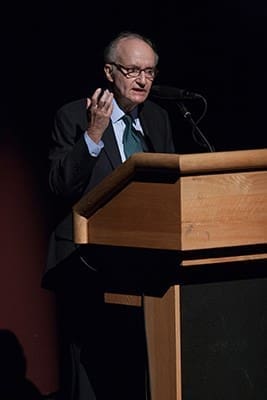
Rabbi James Rudin, an author and leader in interreligious relations, was one of the keynote speakers at the Nostra Aetate Jubilee event. Photo By Thomas Spink
Senior advisor to the American Jewish Committee on interreligious affairs, Rabbi Rudin told the crowd that Pope St. John XXIII, who called the ecumenical Vatican council, wanted to forge a new relationship with the Jewish people. Before being elected pope, he had served as a member of the Vatican diplomatic corps, so he knew firsthand the brutal experience during World War II of the Jewish community, the rabbi said.
The challenge faced by church leaders was to overcome “the teaching of contempt” that was held by many believers, he said, who considered all Jews responsible for the crucifixion of Jesus by the Romans. Speeches and religious education materials at the time portrayed anti-Semitic thoughts, he said. Those ancient tensions were an undercurrent in the church and played a role in the atrocities faced by Jews, including the foundation of Nazism, he said.
“Deicide was never a part of church dogma. But it was held by many, many Christians as a popular belief,” Rabbi Rudin said.
However, “Nostra Aetate” changed church teaching, recognizing Judaism as an eternal religious tradition, he said, and clarifies that there is no supersession of Judaism by Christianity.
Children will carry on “heritage of hope”
Addressing the crowd, Archbishop Wilton D. Gregory said the evening spent with “our beloved Jewish neighbors and friends” is a time to “praise God for this historic document.”
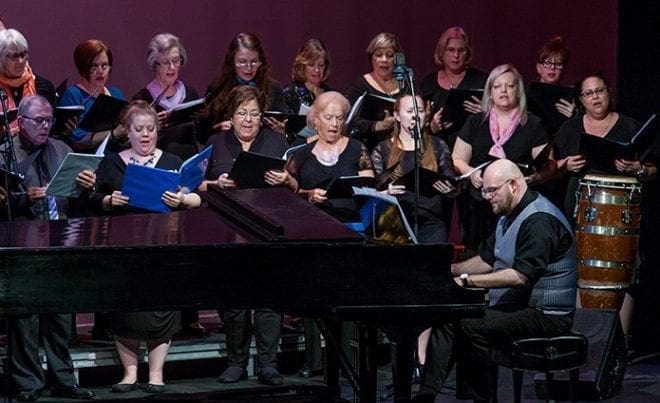
The Jubilee Choir from the Shrine of the Immaculate Conception, Atlanta, performed during the interfaith evening at the Ferst Center. Directed by Dónal P. Noonan, at the piano, the group ended the program with a rousing rendition of “Siyahamba/Marching in the Light of God.” Photo By Thomas Spink
“Together we bask in the joy of our friendship,” he said.
Through the arts, music and drama, the cultural program draws people from both faith communities to greater affection and collaboration, especially young people, he said. It reaffirms Catholic dedication to the ideas set forth in the document.
“We place a great hope in the future this evening that is so obvious in the presence of our children who will continue the heritage of hope,” he said. “Nostra Aetate … continues to need reaffirmation and implementation.”
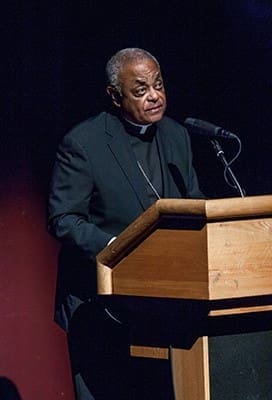
Archbishop Wilton D. Gregory, the second keynote speaker at the Nostra Aetate Jubilee celebration, told the audience, “Together we bask in the joy of our friendship.” Photo By Thomas Spink
In the past, he said he was “sad to admit” some who claimed to be Catholic and Christian were responsible for killing and persecuting Jews. Now, the church has committed itself to speak boldly against the sin of anti-Semitism when it appears, and he expressed confidence that solidarity will extend in both directions.
“Whenever Catholics or other Christians are harassed and subjected to discrimination, we will rely on our Jewish brothers and sisters to stand firm with us against such atrocities,” he said.
History shows that when people are silent in the face of discrimination and harassment, acts of violence can follow, he said, “brutal acts of hatred in the yesterdays of humanity that must not be repeated in the future.”
Fifty years ago the Catholic Church “took a bold step toward a better world in acknowledging the dignity of believers of other traditions,” Archbishop Gregory said.
“This evening, we recall that important step and we pledge ourselves to walk together not only ‘in our time’ but in the tomorrows that lie before us,” he said.
Original drama revisited time of council
The evening cultural exchange program offered visitors much to take in: paintings from local artists loaned by the Archdiocese of Atlanta and the William Breman Jewish Heritage and Holocaust Museum; historical news pages from The Georgia Bulletin, retrieved by the archdiocesan Office of Archives and Records, that traced the ties between the Catholic Church in Atlanta and the Jewish community; costumed dancers, from the Weber School Dance Ensemble and the Amazing Grace Dance Company, who performed to music from both faith traditions; and an original short, four-act dramatic presentation entitled “More Than Hope” that traced the origins of “Nostra Aetate.” This last piece was written especially for the evening program by Mira Hirsch, director of education at Theatrical Outfit, and Chris Moses, director of education at the Alliance Theatre, and performed by local professional actors Pamela Gold, Clayton Landey, Kathleen McManus and Moses.
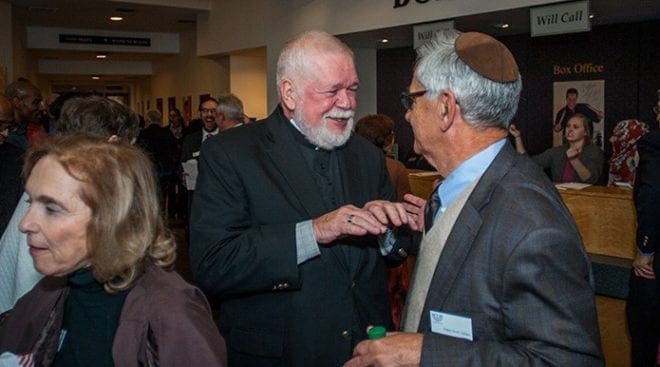
Msgr. Henry Gracz, pastor of the Shrine of the Immaculate Conception, Atlanta, left, converses with Rabbi Scott E. Colbert, senior rabbi of Temple Emanu-El, Atlanta, at the reception before the Nostra Aetate Jubilee celebration Oct. 28. The reception included an art and history exhibition. Rabbi Colbert was a co-chair of the event, and Msgr. Gracz served on the steering committee. Photo By Thomas Spink
During the art show before the program, Rabbi Jeffrey Wohlberg talked about his own journey of dialogue with Catholics in the late 1960s. He lived in Argentina at the time, where there was little overlap between the faith communities. But there was a movement and spirit of wanting to break the barriers, and he found a willing partner in a local priest, he said.
“I had no idea where it was going to lead, but it was nice to talk with each other,” said Rabbi Wohlberg, who paused from admiring the displayed artwork on loan from the Breman Museum. Now retired, he served as a rabbi for 42 years.
As a young religious leader, Rabbi Wohlberg said he was influenced by many people, including the writings of Rabbi Abraham Joshua Heschel. Rabbi Heschel played a role at the Vatican Council in convincing church leaders to change writings considered demeaning by Jews. There was a history of pain and sadness, he said, but tremendous strides have brought the two communities together.
The church leaders are speaking with great sensitivity, honesty and compassion about the Jewish community, he said.
“Jewish and Catholic relations have never been better. We may not be buddies, but we now relate in a totally different way from how things used to be,” he said.
The evening for Scott and Jessica Hodgman, who worship at St. Peter Chanel Church, Roswell, was a reminder of the value of learning from others. They had both attended graduate school at Georgia State University with a focus on religious studies.
“Any opportunity to dialogue with people from other religions is a chance to enrich your own faith and life,” said Jessica Hodgman.